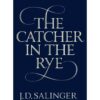The Plague
By: Albert Camus
Synopsis
The townspeople of Oran are in the grip of a deadly plague, which condemns its victims to a swift and horrifying death. Fear, isolation and claustrophobia follow as they are forced into quarantine. Each person responds in their own way to the lethal disease: some resign themselves to fate, some seek blame, and a few, like Dr Rieux, resist the terror.
An immediate triumph when it was published in 1947, The Plague is in part an allegory of France's suffering under the Nazi occupation, and a story of bravery and determination against the precariousness of human existence.
— from Penguin Books
An immediate triumph when it was published in 1947, The Plague is in part an allegory of France's suffering under the Nazi occupation, and a story of bravery and determination against the precariousness of human existence.
— from Penguin Books
Contributor's Note
I read this book in the midst of COVID and what struck me was how the book perfectly mirrored both the courage and folly of humans when faced with adversity. Set in a quarantined Algerian town, The Plague follows a doctor as he grapples with a seemingly unstoppable disease. Camus’ work forced me to confront human resilience, morality, and the search for meaning in a chaotic world. More saliently however, was the importance of community when confronted with hardship, and how the human spirit can triumph even in the most difficult of times.
— Syaiful, CPD
— Syaiful, CPD


